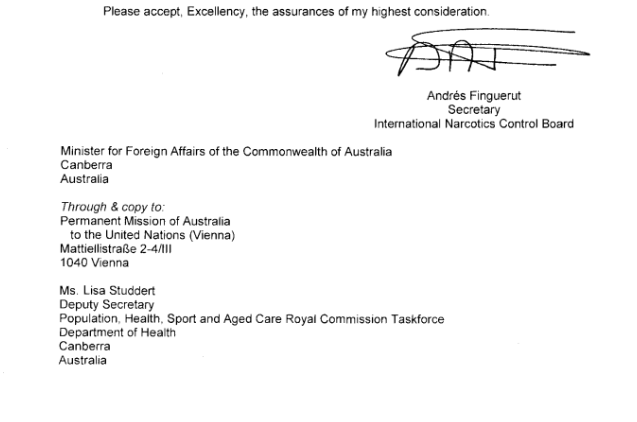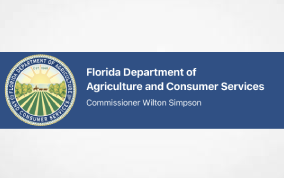Australia’s ABC reports….
The ACT Government has hit back at warnings from the United Nations that legalising cannabis will breach international law, telling the body to instead look at the United States and Canada where the laws go further.
Key points:
- Federal Health Minister Greg Hunt agrees that the legislation is in breach of the UN convention
- A UN board member alleges many countries “pick and choose” which laws to abide by
- The ACT Government says the legislation — taking effect on January 31, 2020 — is “the will of the people”
In a letter to the Federal Government sent following recent “concerning” reports, the UNs’ International Narcotics Control Board (INCB) reiterated that the legalisation and regulation of cannabis for non-medical use, including in small quantities, were inconsistent with international drug conventions.
Australia, along with more than 200 other countries, signed three international conventions agreeing to certain rules about illicit drug use and restrictions about medications.
But ACT Chief Minister Andrew Barr defended the laws that come into effect on January 31, 2020, saying the supply and traffic of cannabis will remain illegal and the UN should turn its attention elsewhere.
“Canada, Colorado and California have cannabis legalisation laws that are much more expansive than the laws passed by the ACT Legislative Assembly last month,” Mr Barr said.
“The International Narcotics Control Board’s attention would be better focused on those cannabis legalisation regimes rather than the ACT’s reforms.
“The [ACT] Government is not encouraging the personal use of cannabis.”
A member of the UN board, Professor Richard Mattick, who is also part of UNSW’s National Drug and Alcohol Research Centre, said the treaties were legally binding and the ACT’s cannabis laws were in contravention.
“Allowing citizens in a country to use cannabis for recreational purposes, or non-medical purposes, is not allowed under the treaties,” he told RN Breakfast.
Professor Mattick said while the ACT was only proposing to legalise a small quantity of cannabis per adult in Canberra, the amount was not relevant.
“The issue is the letter of the law,” he said.
“Many countries do feel very strongly about this, so whilst [some] countries — the United States, Canada, Australia potentially, Uruguay, the Netherlands — are allowing cannabis use, the vast majority of the 200 countries are not in agreement with this.
“It creates a problem when we have a set of rules which we say we should abide by, but we pick and choose which ones we want to abide by.
“It’s about the international agreement.”
UN concerns come after tit-for-tat between ACT, feds
Federal Health Minister Greg Hunt, who has already sounded his opposition to the ACT’s move, said it was clear that the legislation was in breach of the UN convention.
“The Australian Government remains committed to the international drug control regime established by the UN international drug conventions which do not support the legalisation of cannabis for recreational use,” Mr Hunt said.
“While many Australians may view cannabis use as harmless, almost a quarter of Australia’s drug and alcohol treatment services are being provided to people identifying cannabis as their principle drug of concern, roughly the same number of treatment episodes as for amphetamine use.”
Professor Mattick said the role of the board was not to “embarrass” Australia, but it would continue to highlight how the ACT laws do not adhere to the international agreements.
“We are allowing the countries to decide how they will handle this difficult situation,” he said.
“How this rolls out is going to be very interesting because it could see a fraying of the international agreement.”
The concern from the UN follows a tit-for-tat between the Federal and ACT Governments, adding to confusion over how the laws will be practically enforced when the changes come into effect early next year.
Federal Government ministers sharply criticised the ACT’s move, with some labelling it as “crazy” and a “social crusade” by the territory Labor government.
For its part, the ACT Government has urged the Federal Government to respect “democratic processes of the ACT” and said the legislation was “the will of the people”.
FURTHER INFO
UN LETTER
UNITED NATIONS INTERNATIONAL NARCOTICS CONTROL BOARD INCB t4,..d’ OICS NATIONS UNIES ORGANE INTERNATIONAL DE CONTROLE DES STUPEFIANTS Vienna International Centre, P.O. Box 500, A-1400 Vienna! Austria Telephone: +43-1-26060, Telefax: +43-1-25350-5857 / 5868 E-Mail: incb.secretariat@un.org Internet Address http://wvw incb.org/ Ref.: File: INCB-CES AUL 109/19 114 (3)AUL & 161/2 3 October 2019 Excellency, On behalf of the International Narcotics Control Board (INCB), and with reference to the responsibilities of the Board as stipulated in the 1961 Single Convention on Narcotic Drugs as amended by the 1972 Protocol, the 1971 Convention on Psychotropic Substances, and the 1988 United Nations Convention against Illicit Traffic in Narcotic Drugs and Psychotropic Substances, I have the honour to draw your attention to the following matter. The Board has noted with concern recent reports regarding the legalisation of cannabis possession, use and cultivation in small amounts in the Australian Capital Territory, effective 31 January 2020. As the information does not stem from official sources, the Board would appreciate receiving confirmation regarding the accuracy of these reports from your Government. The Board wishes to recall that cultivation, production and distribution of cannabis for nonmedical purposes is inconsistent with the provisions of the 1961 Convention as amended, in particular article 4(c), which requires State parties to limit the use of narcotic drugs exclusively to medical and scientific purposes. The Board wishes to reiterate that the legalization and regulation of cannabis for non-medical use, including in small quantities, would be inconsistent with Australia’s international legal obligations. The Board looks forward to receiving the information requested and to discussing this and other drug-control matters with Australia. Please accept, Excellency, the assurances of my highest consideration. Andrés Finguerut Secretary International Narcotics Control Board Minister for Foreign Affairs of the Commonwealth of Australia Canberra Australia Through & copy to: Permanent Mission of Australia to the United Nations (Vienna) Mattiellistral3e 2-4/Ill 1040 Vienna Ms. Lisa Studdert Deputy Secretary Population, Health, Sport and Aged Care Royal Commission Taskforce Department of Health Canberra Australia
Professor Richard Mattick

















